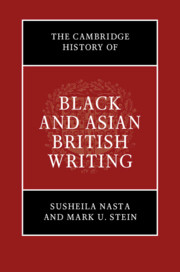Book contents
- The Cambridge History of Black and Asian British Writing
- The Cambridge History of Black and Asian British Writing
- Copyright page
- Dedication
- Contents
- Notes on Contributors
- Preface and Acknowledgements
- Introduction
- Part I New Formations
- 1 Narratives of Resistance in the Literary Archives of Slavery
- 2 Writer-Travellers and Fugitives
- 3 Exoticisations of the Self
- 4 Black People of Letters
- 5 Engaging the Public
- Part II Uneven Histories
- Part III Writing the Contemporary
- Select Bibliography
- Index
2 - Writer-Travellers and Fugitives
Insider–Outsiders
from Part I - New Formations
Published online by Cambridge University Press: 19 December 2019
- The Cambridge History of Black and Asian British Writing
- The Cambridge History of Black and Asian British Writing
- Copyright page
- Dedication
- Contents
- Notes on Contributors
- Preface and Acknowledgements
- Introduction
- Part I New Formations
- 1 Narratives of Resistance in the Literary Archives of Slavery
- 2 Writer-Travellers and Fugitives
- 3 Exoticisations of the Self
- 4 Black People of Letters
- 5 Engaging the Public
- Part II Uneven Histories
- Part III Writing the Contemporary
- Select Bibliography
- Index
Summary
Exploring the trope of the ‘insider-outsider’ which recurs across three centuries of black and Asian British writing, this chapter considers nineteenth-century travellers of African and Asian descent as they made their way in and through Britain. In 1857, following her arrival in Britain after working as a nurse in the Crimea, Mary Seacole published her Wonderful Adventures … in Many Lands. This autobiographical account of her travels casts her quest for economic stability as a series of travel ‘adventures’, revealing the gendered and racialized landscapes she navigated as she sought a livelihood both at home and abroad. Behramji Malabari’s account of his travels to Britain in 1893, The Indian Eye on English Life, offers a different perspective on the pathway through empire. Whilst Seacole expresses a patriotism, which is conflicted by her racial position, Malabari (Parsi journalist and writer from Bombay), is a more disappointed citizen of empire, preoccupied by the sordid and parochial London he encounters. Taken together, their writings serve as ‘traveling provocations’, reminding us of the complex and often contradictory visions hailed by movement across the metropole-colony divide.
- Type
- Chapter
- Information
- The Cambridge History of Black and Asian British Writing , pp. 40 - 53Publisher: Cambridge University PressPrint publication year: 2020

